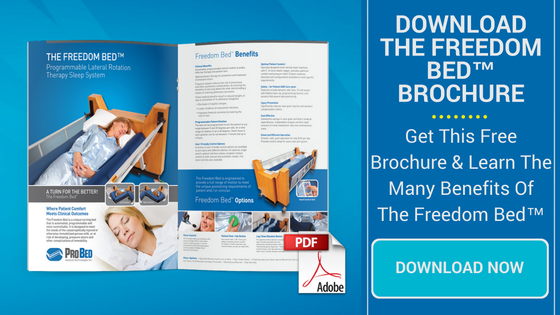ProBed Freedom Bed - Cost vs. Benefits
There are many methods of analyzing the cost effectiveness of the Freedom BedTM.
The direct costs of caring for an otherwise healthy immobilized person are considerable. When that person develops complications of immobility such as pressure ulcers, bladder infections or pneumonia, the costs will rise substantially.
Costs of Bed Sores (Wound Care Analysis)
Analysis of wound care costs over a typical four-year period shows median costs amounting to approximately $400,000. This amount, determined by using the following analysis across a broad spectrum of patients, provides the following breakdown: Required durable medical equipment - $72,000; costs of care related to incidences of pneumonia - $80,000; wound VAC - $36,000; wound management - $125,000; skin flap surgery - $86,000.
Reducing costs, optimizing staff utilization and providing a high level of care are critical in the long-term care of immobilized persons. In addition to the above significant potential savings, the purchase of a Freedom BedTM can also be rationalized on the basis of the bed’s ability to reduce the time and costs associated with the manual turning of immobilized persons. An analysis of the annualized costs of using a programmable Freedom BedTM to turn a bed-fast person versus using one or two nurses/support staff in conjunction with a conventional hospital bed shows annual costs far in excess of the one-time cost of a Freedom BedTM. Again using median figures, home care costs could range from $50,000 per annum for one nurse/support person to $100,000 for two caregivers.
This price comparison is drawn before additional benefits such as fewer back injuries, less sick time, reduced workers’ compensation claims are factored into the potential cost savings.
Home Care
Substantial financial savings will also be enjoyed in home care situations as, in many cases, the use of the Freedom BedTM means that live-in nighttime caregivers will either not be required, or the hours can be significantly reduced. The cost of nighttime caregivers varies dramatically by geographical area as do the rules pertaining to facilities you need to provide for them. This also varies depending on whether you use an agency or hire independently.
Our experience, backed up by independent cost analysis, shows that, depending on the specific needs of the user, the costs of an 8 hour nighttime turning shift often exceeds $50,000 per year. This means that our top of the line Freedom BedTM has paid for itself in less than a year.
In one example, we had a heavy individual who required two people to turn him at night in a home care setting. The agency charged $20 per hour per person. The occupational therapist calculated that the Freedom BedTM would pay for itself in less than six months and the bed would save the insurance company $75,000 for every year– just on repositioning the user!
Recent advances in health-care and state-of-the-art medications mean that people living with varying types of immobility may, in many cases, live a full life span requiring them to be turned every night for decades. The Freedom BedTM meets the challenges of long-term care as it has been designed specifically to provide many years of trouble-free, safe and comfortable service to the user. It is not hard to deduce from this that the Freedom BedTM may well save several hundreds of thousands of dollars over its life span.
Additional Savings by Eliminating Manual Turning of Patients
Fewer Care-giver Back Injuries:
- Fewer sick days
- Reduced workers' compensation claims
- Reduced cost of hiring replacement staff
Reduced Staff Turnover (National average turnover rate for certified nursing assistants (CNAs) = 49% annually):
- Decreased costs of recruiting, hiring and training
- Reduced cost of overtime and/or contract labour
- Reduced cost of using more expensive staff when CNAs not available
Increased Patient Health:
- Reduced risk of pressure ulcers and bladder and respiratory infections through more consistent turning
- Less intervention - patients are more comfortable and sleep better
- Reduced risk of patient injury

